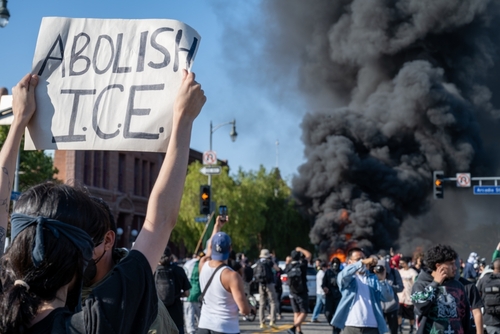Thousands chanting for a “global intifada” in Manhattan have ignited a fierce national debate over free speech, antisemitism, and public safety, prompting immediate bipartisan action in Congress.
Mass Manhattan Protest Spurs Legislative Action
On August 17, 2025, thousands of anti-Israel activists descended on midtown Manhattan, rallying under the “Stand with Gaza” banner and chanting the phrase “global intifada.” The demonstration demanded an end to U.S. support for Israel and condemned Israeli military actions in Gaza. The scale and intensity of the protest drew national attention, especially as bipartisan lawmakers swiftly responded by introducing legislation to denounce the slogan as incitement to violence against Jewish communities. This unprecedented march has become a flashpoint in the ongoing battle between protest rights and public safety, fueling concerns among patriotic Americans about the erosion of constitutional protections and escalating threats to community safety.
The phrase “global intifada” has deep historical roots, originating from Palestinian uprisings marked by violence and loss of life. Since the October 2023 Hamas attack on Israel, this slogan has surfaced in pro-Palestinian protests across the U.S. and Europe, with critics interpreting it as a call for worldwide violence targeting Jews and Israelis. Activists claim the phrase represents solidarity and resistance, but Jewish organizations and lawmakers warn it poses a direct threat to public safety. New York City, home to large Jewish and Arab populations, has become ground zero for such activism, with frequent demonstrations and rising tensions over humanitarian issues and government policy.
Bipartisan Push to Clamp Down on Incitement
In response to the Manhattan protest, U.S. Representatives Josh Gottheimer (D-NJ) and Rudy Yakym (R-IN) introduced legislation condemning “global intifada” as incitement to violence. Gottheimer declared the slogan “a call to violence against Israeli and Jewish people across the world,” reflecting growing bipartisan concern for the safety of Jewish communities. The proposal has sparked intense debate in Congress, with some legal experts warning that criminalizing protest slogans could infringe on First Amendment rights. Others argue that incitement to violence is not protected speech, especially when tied directly to antisemitic attacks or threats. The legislation remains pending, with public safety advocates and constitutional defenders watching closely.
Ongoing daily protests in New York and other cities continue to demand an end to U.S. support for Israel and highlight humanitarian issues in Gaza. Organizers frame the movement as a fight against genocide and for Palestinian liberation, while critics point to rising antisemitic incidents and the dangerous rhetoric fueling polarization. The media’s coverage of these events further intensifies the controversy, with accusations of bias and underreporting from both sides of the debate.
Constitutional Values Under Siege
Jewish communities nationwide have reported increased threats and incidents of vandalism, prompting calls for enhanced security measures and renewed vigilance. The broader population faces disruptions and heightened anxiety as public discourse grows more divisive. Lawmakers and community leaders grapple with the challenge of balancing advocacy and free speech against the imperatives of safety and social cohesion. The situation in Manhattan highlights the vulnerability of core American principles—individual liberty, limited government, and family values—when confronted by extreme activism and government overreach. Many conservatives view the controversy as a battleground for defending the Constitution and resisting attempts to erode foundational protections.
Read "Thousands storm Manhattan calling for ‘global intifada,’ a phrase with a pending violence designation" on SmartNews: https://t.co/lHfgPimTTP #SmartNews
— Latty Kyress (@LattyKyress) August 18, 2025
The long-term implications of this flashpoint protest are profound. Potential legislative changes may redefine protest rights and hate speech standards, influencing future activism and policy. Jewish and Palestinian communities remain at the center of the debate, while political candidates and officeholders adjust their positions under public scrutiny. The controversy over “global intifada” not only reflects deep societal divisions but also tests the limits of constitutional freedoms and the government’s responsibility to safeguard its citizens. As protests continue and legislation advances, Americans must decide how to protect their values—and their safety—in an era of escalating political and cultural conflict.
Sources:
Combat Antisemitism Movement: Weekly Report, August 14, 2025

